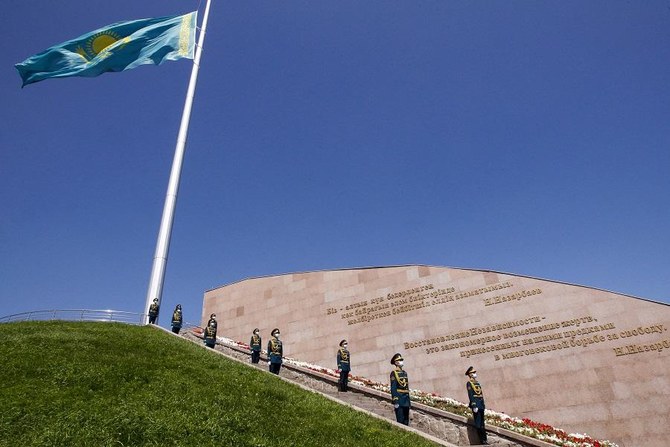NUR-SULTAN, Kazakhstan: Kazakhstan abolished the death penalty, making permanent a nearly two-decade freeze on capital punishment in the authoritarian Central Asian country, a notice on the presidential website said Saturday.
The notice said President Kassym-Jomart Tokayev had signed off on parliamentary ratification of the Second Optional Protocol to the International Covenant on Civil and Political Rights — a document that commits signatories to the abolition of capital punishment.
Executions were paused in Kazakhstan from 2003 but courts continued to sentence convicts to death in exceptional circumstances, including for crimes deemed acts of terror.
Ruslan Kulekbayev, a lone gunman who killed eight policemen and two civilians during a rampage in Kazakhstan’s largest city Almaty in 2016, was among the convicts set to be executed if the moratorium were lifted.
Kulekbayev will now serve a life sentence in jail instead.
Kazakhstan abolishes death penalty
https://arab.news/4myjz
Kazakhstan abolishes death penalty

- President Kassym-Jomart Tokayev had signed off on parliamentary ratification of the Second Optional Protocol to the International Covenant on Civil and Political Rights
After nearly 7 weeks and many rumors, Bolivia’s ex-leader reappears in his stronghold

- Morales was Bolivia’s first Indigenous president who served from 2006 until his fraught 2019 ouster and subsequent self-exile
- He dismissed rumors fueled by local politicians and fanned by social media that he would try to flee the country
LA PAZ: Bolivia’s long-serving socialist former leader, Evo Morales, reappeared Thursday in his political stronghold of the tropics after almost seven weeks of unexplained absence, endorsing candidates for upcoming regional elections and quieting rumors he had fled the country in the wake of the US seizure of his ally, Venezuela’s ex-President Nicolás Maduro.
The weeks of hand-wringing over Morales’ fate showed how little the Andean country knows about what’s happening in the remote Chapare region, where the former president has spent the past year evading an arrest warrant on human trafficking charges, and how vulnerable it is to fears about US President Donald Trump’s potential future foreign escapades.
The media outlet of Morales’ coca-growing union, Radio Kawsachun Coca, released footage of Morales smiling in dark sunglasses as he arrived via tractor at a stadium in the central Bolivian town of Chimoré to address his supporters.
Morales, Bolivia’s first Indigenous president who served from 2006 until his fraught 2019 ouster and subsequent self-exile, explained that he had come down with chikungunya, a mosquito-borne ailment with no treatment that causes fever and severe joint pain, and suffered complications that “caught me by surprise.”
“Take care of yourselves against chikungunya — it is serious,” the 66-year-old Morales said, appearing markedly more frail than in past appearances.
He dismissed rumors fueled by local politicians and fanned by social media that he would try to flee the country, vowing to remain in Bolivia despite the threat of arrest under conservative President Rodrigo Paz, whose election last October ended nearly two decades of rule by Morales’ Movement Toward Socialism party.
“Some media said, ‘Evo is going to leave, Evo is going to flee.’ I said clearly: I am not going to leave. I will stay with the people to defend the homeland,” he said.
Paz’s revival of diplomatic ties with the US and recent efforts to bring back the Drug Enforcement Administration — some 17 years after Morales expelled American anti-drug agents from the Andean country while cozying up to China, Russia, Cuba and Iran — have rattled the coca-growing region that serves as Morales’ bastion of support.
Paz on Thursday confirmed that he would meet Trump in Miami on March 7 for a summit convening politically aligned Latin American leaders as the Trump administration seeks to counter Chinese influence and assert US dominance in the region.
Before proclaiming the candidates he would endorse in Bolivia’s municipal and regional elections next month, Morales launched into a lengthy speech reminiscent of his once-frequent diatribes against US imperialism.
“This is geopolitical propaganda on an international scale,” he said of Trump’s bid to revive the Monroe Doctrine from 1823 in order to reassert American dominance in the Western Hemisphere. “They want to eliminate every left-wing party in Latin America.”













